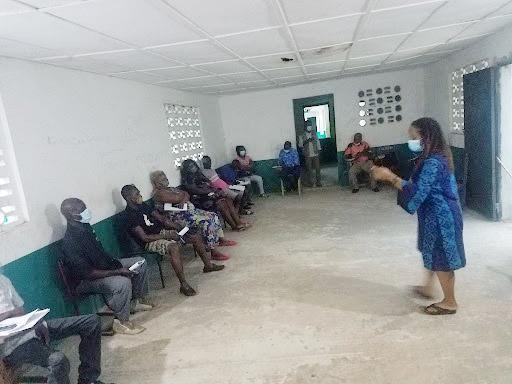“Family Needs to Share Responsibility”

Mrs. Moore speaks at the evening conversation on Negative, Positive Norms of gender roles
--- Brenda Moore Underscores Importance of Sharing Family’s Home Responsibilities
The Executive Director of the Kids’ Educational Engagement Project (KEEP), Brenda Moore, has underscored the importance of sharing family home responsibilities equally in the home with any attachment.
Over the years, Brenda says, society has assigned roles and responsibilities to men and women in managing the home but with women having more tasks in the home, while the men are responsible to work and bring in money for the home.
Often, the woman (wife, mother) is responsible for managing the home, including cooking, preparing the children for school, cleaning the house, and washing clothes.
Mrs. Moore made the remarks during a series of interactive evening conversations on the OXFAM’s European Union (EU) “Enough Project”, with community dwellers of Gbengbar Town on the Robertsfield Highway, organized by KEEP on July 6.
Mrs. Moore said the evening conversation is aimed at discussing gender roles and how society defines gender roles and expectations, focusing on both positive and negative impacts on Liberian society.
“We intend to stimulate conversation and also try to shift the mindset of gender roles, gender norms, and some of the harmful norms in our society that affect us negatively,” she said.
According to her, with constant conversation around gender roles, she believes that people will start to change and Liberia will be a better place for everyone.
“This evening's conversation was not telling participants what’s right or wrong, but mostly about experience sharing,” Mrs. Moore said. “We tried to unpack some of the things and to see some of the norms we have that hurt the society and also some of the positive norms that we can encourage male figures to emulate.”
She added that the conversation was also aimed at hearing from mainly male participants as to why they come from certain perspectives in terms of managing the home.
Interestingly, Mrs. Moore noted, some participants were asked their views on what a man would do if his wife gave birth, and some of them responded that they would shower her with love.
“If my wife is in pain, I just runway because I am unable to handle it,” said others.
According to her, there is a need to know the difference between the man who helps his wife in the home and the one who doesn't. She said more good things come out when both the husband and wife are managing the home together.
She said 12 communities around the country, including Grand Gedeh, River Cess, and Montserrado counties are expected to benefit from the conversation.
According to her, KEEP will be selecting and recruiting positive mass community ambassadors, particularly men in the community and society in general, who have stood out as positive role models as a way to dispel the negative perception that “men don't do these things”.
Mrs. Moore said there are fathers in Liberia who are doing positive things. Therefore, call for highlighting them because there more impact on positive reinforcement as opposed to negative reinforcement.
She indicated that about 120 persons are expected to benefit from the ongoing evening conversation, organized by KEEP, stating "we are the conversation with an existing structure that KEEP worked with in the past."
Samuel W. Kimba, Principal of June L. More High schools, and a beneficiary of the training said this training has added more knowledge to them to improve and do more for our various homes and communities.
“It will be hard for society to accept but we will continue to create awareness and educate our people. We have to have constant workshops in different communities and schools so that people can be aware of how the world has changed and therefore, no one should think that only a wife is responsible to cook in the home,” Mr. Karbia, a father of four, said.
According to him, there’s a need to have such awareness on the radio as some people may not have the time to attend training and workshops.
Evon Chebo, a mother of two children, and a participant said the training has given her more experience in managing her home and will now begin to put things in place.
“It’s a good program and I think they just need to take this program to other communities to allow more people to benefit. Additionally, we still need more training and I hope more people will benefit,” Madam Chebo said.
Miatta Conrab, a participant said she was impressed as the discussion signifies a new beginning of a family, especially doing things together in Liberia.
"We can help each other in the home to make Liberia a better place. We don't need to depend on one person to do a particular work, including cooking, washing clothes, going to the market and cleaning the home," Madam Conrab said.
Madam Conrab, a businesswoman said it's time now for every organization to get involved in creating awareness on building a family void of separation of duties for the good of the Liberian society.
